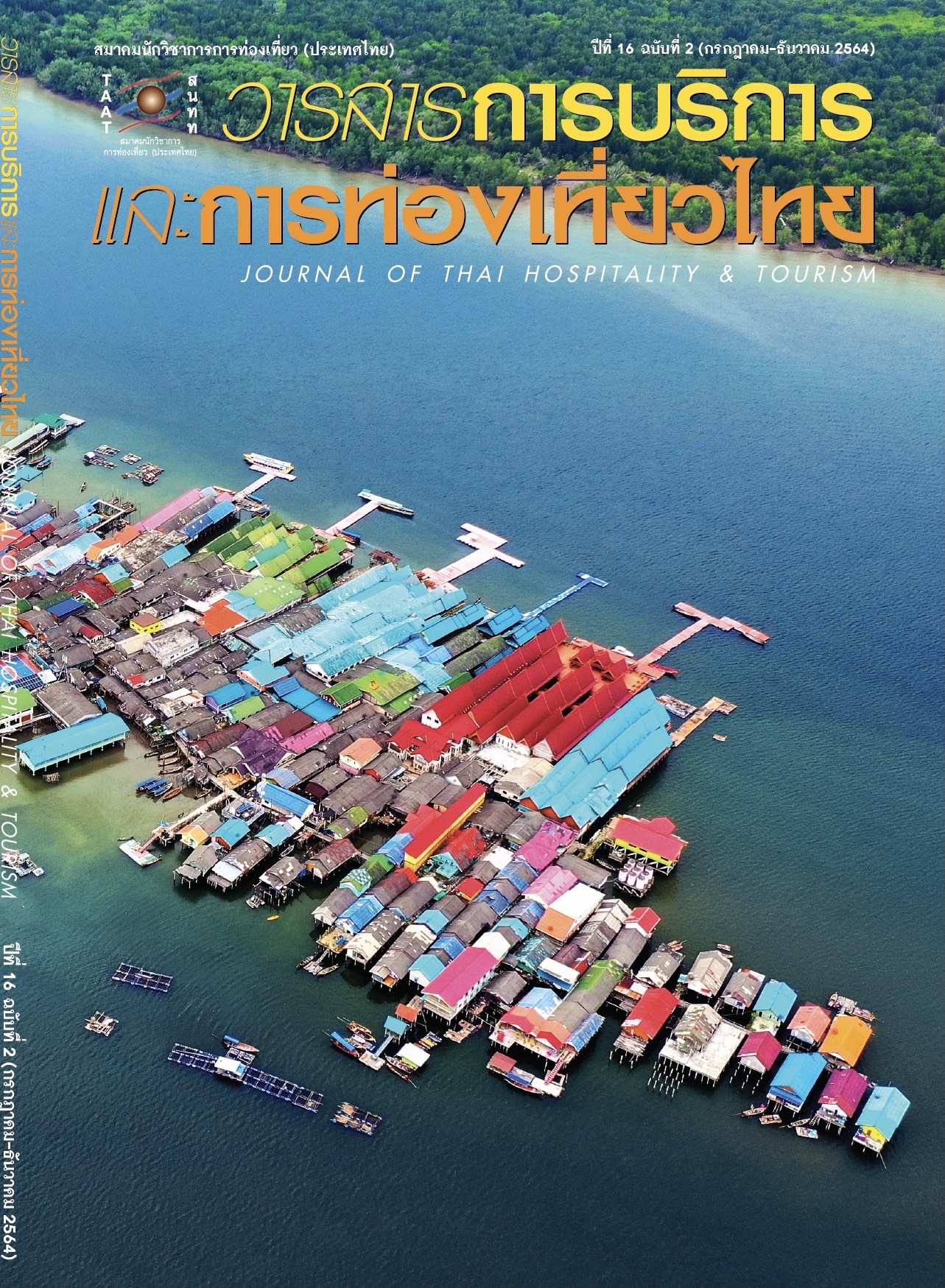แนวทางการฝึกอบรมเพื่อพัฒนาทักษะภาษาอังกฤษของแม่บ้านโรงแรมชาวไทย
Main Article Content
บทคัดย่อ
การวิจัยครั้งนี้มีวัตถุประสงค์เพื่อ 1) ศึกษาปัญหาและความต้องการพัฒนาทักษะภาษาอังกฤษเพื่อการทำงานของแม่บ้านโรงแรมชาวไทย 2) หาทักษะภาษาอังกฤษเพื่อการทำงานที่แม่บ้านโรงแรมชาวไทยจำเป็นต้องพัฒนา และ 3) เสนอแนวทางการฝึกอบรมเพื่อพัฒนาทักษะภาษาอังกฤษเพื่อการทำงานของแม่บ้านโรงแรมชาวไทย กลุ่มตัวอย่างในการวิจัย ได้แก่ แม่บ้านโรงแรมชาวไทยที่ทำงานในประเทศไทยจำนวน 400 คน ใช้วิธีเลือกกลุ่มตัวอย่างแบบเจาะจง เครื่องมือที่ใช้ในการวิจัยครั้งนี้ ได้แก่ แบบสอบถามปัญหาและความต้องการพัฒนาทักษะภาษาอังกฤษเพื่อการทำงานของแม่บ้านโรงแรมชาวไทย สถิติที่ใช้ในการวิเคราะห์ข้อมูล ได้แก่ ร้อยละ ค่าเฉลี่ยส่วนเบี่ยงเบนมาตรฐาน และค่าดัชนีความต้องการจำเป็น
ผลการวิจัยพบว่า 1) กลุ่มตัวอย่างยอมรับว่าตนเองมีทักษะภาษาอังกฤษในระดับต่ำที่สุดในทุกด้าน และต้องการพัฒนาทักษะด้านการพูดสูงที่สุด 2) ทักษะที่จำเป็นต้องพัฒนามากที่สุด ได้แก่ การพูด และ 3) แนวทางการฝึกอบรมประกอบด้วย 6 ด้าน ได้แก่ 1) ด้านผู้รับผิดชอบการจัดการฝึกอบรมและกิจกรรม 2) ด้านวิธีการฝึกอบรมและการทำกิจกรรม 3) ด้านระยะเวลาการฝึกอบรมและการทำกิจกรรม 4) ด้านช่องทางการสื่อสาร 5) ด้านการวัดและประเมินผลการเรียนรู้ และ 6) ด้านการประเมินความพึงพอใจของผู้ร่วมกิจกรรม
Article Details
เอกสารอ้างอิง
Ally, M. (2009). Mobile Learning: Transforming the Delivery of Education and Training. Edmonton: AU Press.
Baharudin, S., Murad, M. & Mat, N. H. H. (2013). Challenges of Adult Learners: A Case Study of Full Time Postgraduates Students. Procedia–Social and Behavioral Sciences, 90, 772–781.
Beach, D. S. (1980). Personnel – The Management of People at Work. New York: Macmillan.
Brahmawong, C. (1983). Distance Education and Human Resource Development. School of Educational Studies, Sukhothai Thammathirat Open University.
Brookfield, S. D. (1986). Understanding and Facilitating Adult Learning: A Comprehensive Analysis of Principles and Effective Practices. California: Jossey–Bass, Inc.
Brumfit, C. (1984). Communicative Methodology in Language Teaching. United Kingdom: Cambridge University Press.
Catanzaro, S. J. (1996). Negative Mood Regulation Expectancies, Emotional Distress, and Examination. Personality and Social Psychology Bulletin, 22(10). 1023–1029.
Condé Nast Traveller. (2017). The Best Countries in the World. Retrieved from http://www.cntraveller.com/gallery/best-countries-in-the-world
Coombs, P. H. & Ahmed, M. (1974). Attacking Rural Poverty: How Non-Formal Education Can Help. Baltimore: John Hopkins University Press.
Edstrom, K. (2008). Doing Course Evaluations as if Learning Matters Most. Higher Education Research and Development, 27, 95–106.
Gammasit, A. (2008). Employees’ Characteristics of Successful Boutique Hotels in Chiang Mai Province. Faculty of Business Administration, Chiang Mai University.
Hashim, K. F., Tan, F. B. & Rashid, A. (2014). Adult Learners’ Intention to Adopt Mobile Learning: A Motivational Perspective. Retrieved from http://aut.researchgateway.ac.nz/handle/10292/7030
Hoffer, A., George, F. J. & Valacich, S. T. (2011). Modern System Analysis and Design. New Jersey: Pearson Prentice–Hall.
Hsu, L. (2011). The Perceptual Learning Styles of Hospitality Students in a Virtual Learning Environment: the Case of Taiwan. Journal of Hospitality, Leisure, Sport and Tourism Education, 10(1), 114–127.
Hutchinson, T. & Walters, A. (1987). English for Specific Purposes: A Learning-Centered Approach. United Kingdom: Cambridge University Press.
Kalasin, S. & Charumanee, N. (2015). English Needs of Thai Hotel Front Desk Staff in Tourist Attractions of Southern Thailand in the Move towards ASEAN Economic Community 2015. Journal of Liberal Arts, Prince of Songkla University, Hat Yai Campus, 7(2), 1–22.
Knowles, M. (1984a). Andragogy in Action. San Francisco: Jossey–Bass.
Knowles, M. (1984b). The Adult Learner: A Neglected Species. Texas: Gulf Publishing.
McKay, V. & Northedge, A. (1995). Adult Learning Practitioner Training Course for Adult Basic Education and Training Module 2. Pretoria: University of South Africa.
Ministry of Education. (2008). The Non–Formal and Informal Education Promotion Act B.E. 2551 (2008). Retrieved from http://www.moe.go.th/moe/nipa/ed_law/p.r.g.edu31.pdf
Moore, B. (2012). Discovering the Language Needs of Hotel Workers in Thailand. Thammasat Journal, 2(31), 1–12.
Moran, J. J. (1997). Assessing Adult Learning: A Guide for Practitioners. Malabar: Krieger.
Moyer, L. A. (2016). Engaging Students in 21st Century Skills through Non–Formal Learning. Virginia Polytechnic Institute and State University, United States.
National Statistical Office. (2016). The 2016 Hotels and Guest Houses Survey. Bangkok: Ministry of Information Communication Technology.
Pandamrongsatit, S. (2013). The Needs of English Using for Staff in Hotel Business Enterprises. Pathumthani University Academic Journal, 5(1), 29–38.
Pongjumpa, S. (2011). A Survey of the Needs of English Proficiency of Five–Star Hotel’s Staff; and Representatives in Bangkok and the Aspect of Needs Referring to Hotel English and General English. Language Institute, Thammasat University.
Pongkhomfoei, S. et al. (2016). The Lessons Learned by Housekeeping in Boutique Hotel Business Success in Chiang Rai. Journal of Pacific Institute of Management Science, 2(1), 13–20.
Ratana–ubol, A. (2008). Learning Development and Activity Management for Adults. Bangkok: Chulalongkorn University Press.
Reuters. (2017). Thailand Tourist Numbers Rise Nearly Nine Percent in 2016. Retrieved from https://www.reuters.com/article/us-thailand-tourism-idUSKBN14P0QF
Sproule, R. (2000). Student Evaluations of Teaching: A Methodological Critique of Conventional Practices. Education Policy Analysis Archives, 8(50), 125–142.
Sungsri, S. (2006). Distance Education. Nonthaburi: Sukhothai Thammathirat Open University.
Tangsawanit, S. (2004). Developing a Model of Cooperation between Financial Institutions and Public Universities in A Distance Learning Program for Staff Development. Bangkok: Chulalongkorn University Press.
Tawisuwan, S. (2002). Instruction Training Media Development in Non–Formal Education. School of Educational Studies, Sukhothai Thammathirat Open University.
Tourism Authority of Thailand. (2018). Amazing Thailand Tourism Year 2018. Retrieved from https://thai.tourismthailand.org
Van Rooyen, A. (2014). Distance Education Accounting Students’ Perceptions of Social Media Integration. Procedia–Social and Behavioral Sciences, 176, 444–450.
Wilcox, S. (1996). Fostering Self–Directed Learning in the University Setting. Studies in Higher Education, 21(2), 165–176.


